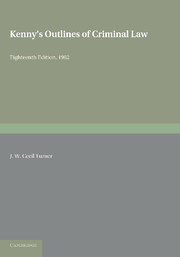Book contents
- Frontmatter
- Preface to the Sixteenth Edition
- Preface to The Seventeenth Edition
- Preface to the Eighteenth Edition
- Contents
- Index of cases
- Index to the principal statutes
- List of principal books cited
- BOOK I GENERAL CONSIDERATIONS
- BOOK II DEFINITIONS OF PARTICULAR CRIMES
- BOOK III MODES OF JUDICIAL PROOF
- BOOK IV CRIMINAL PROCEDURE
- CHAPTER XXIX LIMITATIONS ON CRIMINAL JURISDICTION
- CHAPTER XXX CRIMINAL COURTS
- CHAPTER XXXI SUMMARY PROCEDURE
- CHAPTER XXXII ORDINARY PROCEDURE
- CHAPTER XXXIII ORDINARY PROCEDURE
- CHAPTER XXXIV ORDINARY PROCEDURE
- Appendix I The meaning of ‘credit’
- Appendix II II Rules as to admission of evidence which reveals to the jury facts discreditable to the person accused
- Appendix III III Forms of indictment
- Index
CHAPTER XXXII - ORDINARY PROCEDURE
from BOOK IV - CRIMINAL PROCEDURE
Published online by Cambridge University Press: 05 June 2016
- Frontmatter
- Preface to the Sixteenth Edition
- Preface to The Seventeenth Edition
- Preface to the Eighteenth Edition
- Contents
- Index of cases
- Index to the principal statutes
- List of principal books cited
- BOOK I GENERAL CONSIDERATIONS
- BOOK II DEFINITIONS OF PARTICULAR CRIMES
- BOOK III MODES OF JUDICIAL PROOF
- BOOK IV CRIMINAL PROCEDURE
- CHAPTER XXIX LIMITATIONS ON CRIMINAL JURISDICTION
- CHAPTER XXX CRIMINAL COURTS
- CHAPTER XXXI SUMMARY PROCEDURE
- CHAPTER XXXII ORDINARY PROCEDURE
- CHAPTER XXXIII ORDINARY PROCEDURE
- CHAPTER XXXIV ORDINARY PROCEDURE
- Appendix I The meaning of ‘credit’
- Appendix II II Rules as to admission of evidence which reveals to the jury facts discreditable to the person accused
- Appendix III III Forms of indictment
- Index
Summary
PRELIMINARY STEPS
Trial by jury. Ten possible stages. From the modern and purely statutory form of procedure which prevails in courts of summary jurisdiction, we now pass to the more ancient form which prevails in those courts where offenders are tried in the common law manner, that is to say, by a jury. In this procedure—still styled ‘ordinary’, though now far rarer than the summary—there are ten possible stages which call for explanation. These are (1) information; (2) arrest; (3) commitment for trial; (4) prosecution, i.e. accusation; (5) arraignment; (6) plea and issue; (7) trial and verdict; (8) judgment; (9) reversal of judgment; (10) reprieve or pardon.
Early methods of detection and arrest. During the greater portion of the history of English criminal law its provisions for the detection and arrest of offenders were very defective. In the earliest times, indeed, excellent provision had been made by the system of frankpledge. A frankpledge was a group of adult males—sometimes all those within a particular township, sometimes only a ‘tithing’ or group of ten, selected individually—who were liable to amercement if they did not surrender to justice any one of their number who committed a crime (each individual in the group is sometimes also called a ‘frankpledge’). This institution apparently only existed south of the Humber; but probably arose there as far back as the Anglo-Saxon period. From at least the time of Henry I a ‘view of frank-pledge’ was taken by the sheriff periodically, at which the above-mentioned amercements were collected. After the frankpledges fell into decay in the fourteenth century, England possessed no effective machinery for arresting criminals or for preventing the commission of crime, until the creation, by Sir Robert Peel's energy, of the modern police force. Even in London, as stated in the preamble to his Act, ‘the local establishments of nightly watch and nightly police have been found inadequate to the prevention and detection of crime, by reason of the frequent unfitness of the individuals employed, the insufficiency of their number, the limited sphere of their authority, and their want of connexion and co-operation with each other’.
- Type
- Chapter
- Information
- Kenny's Outlines of Criminal Law , pp. 560 - 575Publisher: Cambridge University PressPrint publication year: 2013



